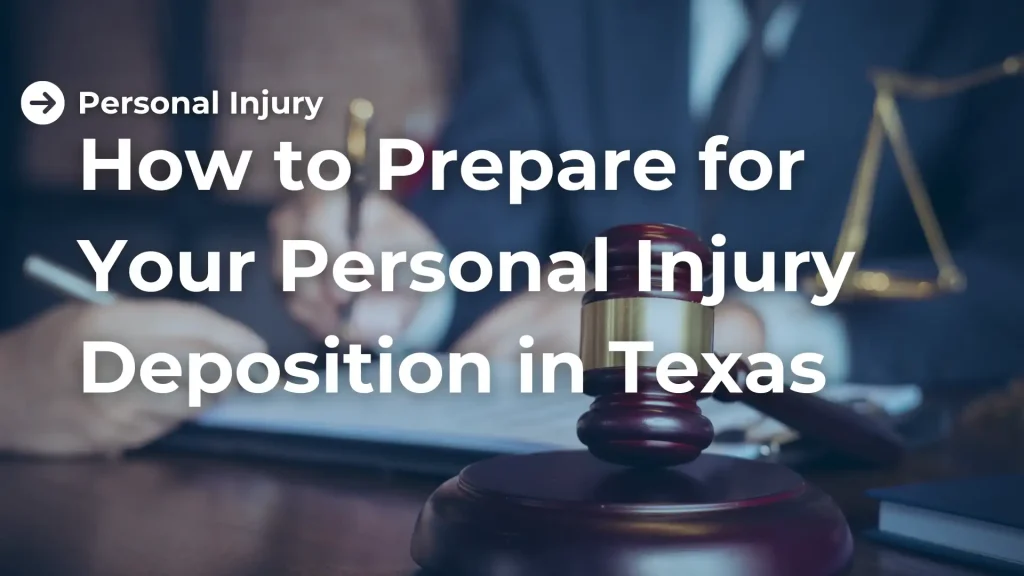 Preparing for a personal injury deposition is crucial to the discovery phase in Texas personal injury trials. With the proper preparation, your testimony could make a strong impression that keeps insurance defense lawyers on their toes.
Preparing for a personal injury deposition is crucial to the discovery phase in Texas personal injury trials. With the proper preparation, your testimony could make a strong impression that keeps insurance defense lawyers on their toes.
This guide can help you understand what to expect during your personal injury deposition and how to prepare. However, it’s only a starting point, and you should discuss specific preparation strategies with your legal team.
What Is a Personal Injury Deposition?
A deposition is sworn testimony that a person (called a deponent) gives under oath outside of a trial. Either side can ask the court to issue a deposition subpoena. For filing personal injury lawsuits, it’s common for insurance companies to want a deposition from the plaintiff. However, your lawyer can also seek a deposition from eyewitnesses, expert witnesses, or the party who caused your injuries.
Once a deposition is complete, the testimony enters the official record. Both sides have access to the recordings and transcripts for use as evidence.
Why Depositions Matter in a Personal Injury Case
Depositions serve a few different purposes in a personal injury case, including:
- Gathering information – Both sides use depositions to identify contradictions. Your lawyer can also use them to help establish critical facts and vet witnesses before a trial.
- Assessing your case – Defense attorneys may use depositions to determine where they stand in settlement negotiations. They may be more inclined to offer you a fair settlement if you provide strong and consistent testimony that corroborates other pieces of evidence.
- Assessing credibility – You may be asked the same questions at trial as you answered during your deposition. Consistent answers can help your case. However, if you give inconsistent answers, the defense may try to argue against your credibility.
Not every personal injury case you know involves depositions. In Texas, they’re more likely to happen if there’s disputed liability or an insurance company contests the severity of your injuries.
The Deposition Process
The Texas Rules of Civil Procedure govern two types of depositions, each with its own process.
Depositions upon Oral Examination
Depositions upon oral examination usually occur in an attorney’s office, but can also happen electronically or by phone. Besides the defense lawyer who will question you, your own lawyer and a court reporter will be present.
Here’s how the process works:
- Taking the oath – The court reporter begins the deposition by administering the oath to you. From that point on, you must tell the truth.
- Answering questions – The questioning lawyer will ask you about the accident, your injuries, your recovery, and your quality of life. Everyone’s conduct must follow the same standards as if they were in a courtroom.
- Making objections – Your attorney can’t answer questions for you, but they will object if a question violates procedural rules. They may also ask you not to answer a question under certain circumstances.
- Transcription – The court reporter records and transcribes everything said during the deposition.
The law limits depositions upon oral examination to six hours per witness and allows for breaks as necessary. You can speak with your lawyer during breaks for further guidance.
Depositions upon Written Questions
Depositions upon written questions are less common, but they can sometimes be more efficient. Your legal team will receive and evaluate questions in advance, and they have a fixed deadline to make objections. Once the questions are finalized, you will respond to them under oath before a court reporter, clerk, or licensed notary.
How to Prepare for a Personal Injury Deposition
 Now that you know more about what to expect, here are some tips to help you prepare for a deposition in your personal injury case.
Now that you know more about what to expect, here are some tips to help you prepare for a deposition in your personal injury case.
Consult with Your Attorney
Your attorney is your most valuable preparation resource. They should meet with you well before the day to:
- Review your case and the evidence
- Go through practice questions to build your confidence
- Discuss how to handle sensitive questions
- Explain what questions might warrant an objection
Prepare for Common Questions
During preparation meetings, you’ll learn how to handle each of these common types of deposition questions:
- Questions on your personal background
- Questions about what specifically happened before, during, and after the accident
- Questions about your injuries and medical treatment
- Questions on how your injuries have affected your quality of life/ability to work
- Questions on any past statements you made in public, online, or to insurance adjusters
Stay Professional
Depositions are formal in nature, and how you present yourself matters for your case. Dress in clean business-casual clothing, and arrive on time so as not to delay the proceedings. During the deposition, remain calm and respond respectfully to different types of questions, even if they are aggressive or provoking.
Know What Not to Say
Once the court reporter swears you in, honesty is non-negotiable. However, there is still some information you should not provide during the deposition, and you should carefully phrase the information you do provide. Follow these guidelines to protect your rights:
- Answer only the question asked of you, and don’t volunteer extra information.
- If you genuinely don’t know or don’t remember something, you can say “I don’t know” or “I don’t remember.”
- Never use “never” or “always,” as the defense could use these absolutes against you.
- You may ask the questioning attorney to clarify what they are asking you.
Your lawyer will advise you more specifically on what not to say.
Know How to Manage Deposition Anxiety
It’s completely normal to feel nervous before and during a deposition. However, in our experience, the more informed and prepared you are to answer the questions, the more confidence you’ll have.
These strategies might help you during the proceedings:
- Take a few minutes to breathe before the deposition and during breaks.
- Pause as necessary before you answer a question. Court reporters don’t record silence.
- At this stage, focus on the facts and your honest answers rather than your case’s long-term outcome.
- You may ask for a break if you feel overwhelmed or need to talk with your attorney. Remember that they are there to protect and guide you through the process.
Contact a Houston Personal Injury Deposition Attorney
The experienced personal injury attorneys in Houston at Gibson Hill Personal Injury are ready to review your case and help you prepare for a deposition if you are subpoenaed. Since 2013, Ty Gibson and Brent M. Hill have fought for injured Texans with a customized, aggressive, and relationship-focused approach. We take pride in handling each case personally, so you won’t be just another number on a docket. Contact our office today at 713-659-4000 or contact us online for a free consultation.




